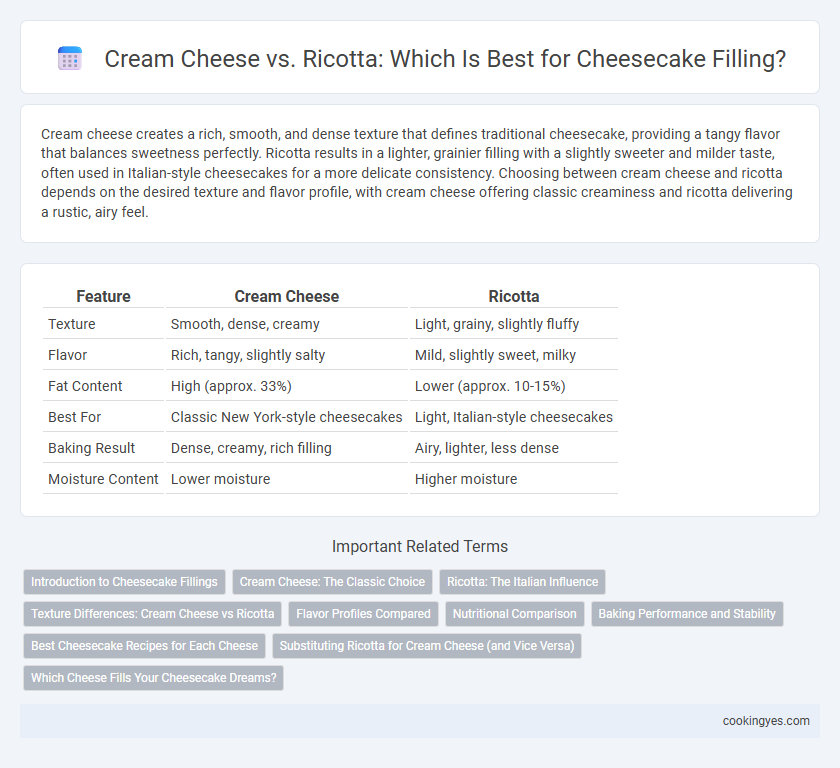Cream cheese creates a rich, smooth, and dense texture that defines traditional cheesecake, providing a tangy flavor that balances sweetness perfectly. Ricotta results in a lighter, grainier filling with a slightly sweeter and milder taste, often used in Italian-style cheesecakes for a more delicate consistency. Choosing between cream cheese and ricotta depends on the desired texture and flavor profile, with cream cheese offering classic creaminess and ricotta delivering a rustic, airy feel.
Table of Comparison
| Feature | Cream Cheese | Ricotta |
|---|---|---|
| Texture | Smooth, dense, creamy | Light, grainy, slightly fluffy |
| Flavor | Rich, tangy, slightly salty | Mild, slightly sweet, milky |
| Fat Content | High (approx. 33%) | Lower (approx. 10-15%) |
| Best For | Classic New York-style cheesecakes | Light, Italian-style cheesecakes |
| Baking Result | Dense, creamy, rich filling | Airy, lighter, less dense |
| Moisture Content | Lower moisture | Higher moisture |
Introduction to Cheesecake Fillings
Cream cheese provides a rich, smooth texture and tangy flavor that defines classic New York-style cheesecake. Ricotta offers a lighter, grainier consistency with a subtle sweetness, commonly used in Italian-style cheesecakes. Choosing between cream cheese and ricotta affects the cheesecake's moisture, density, and overall taste profile.
Cream Cheese: The Classic Choice
Cream cheese remains the classic choice for cheesecake filling due to its rich, smooth texture and slightly tangy flavor that provides a perfect balance of creaminess and sweetness. Its high fat content enhances the cheesecake's density and moisture, resulting in that signature velvety bite that defines traditional cheesecakes. Unlike ricotta, cream cheese offers a more consistent, stable structure ideal for creating a dense and cohesive filling.
Ricotta: The Italian Influence
Ricotta cheese, a staple in Italian cheesecake recipes, offers a lighter and grainier texture compared to cream cheese, lending a delicate and slightly sweet flavor to the filling. Its higher moisture content and lower fat percentage create a less dense cheesecake, making it ideal for those seeking a more airy and fresh dessert experience. Ricotta-based cheesecakes often showcase traditional Italian influences, highlighting the cheese's versatility and ability to blend seamlessly with citrus zest, honey, or vanilla.
Texture Differences: Cream Cheese vs Ricotta
Cream cheese delivers a dense, smooth, and creamy texture ideal for classic, rich cheesecake filling, while ricotta offers a lighter, slightly grainy consistency that results in a fluffier and less dense dessert. The moisture content in ricotta contributes to a more delicate and airy bite, contrasting with the firm, velvety structure given by cream cheese. Choosing between cream cheese and ricotta significantly affects the cheesecake's mouthfeel and overall texture profile.
Flavor Profiles Compared
Cream cheese offers a rich, tangy flavor with a smooth, creamy texture that creates the classic cheesecake taste, while ricotta has a lighter, slightly grainy texture and a mild, subtly sweet flavor. The tanginess of cream cheese balances the sweetness in traditional cheesecakes, whereas ricotta lends a delicate, fresh dairy note ideal for lighter, Italian-style cheesecakes. Choosing between them impacts the final flavor profile, with cream cheese providing a dense, velvety finish and ricotta resulting in a more airy, less intensely flavored filling.
Nutritional Comparison
Cream cheese contains higher fat content and calories than ricotta, making it richer and creamier for cheesecake fillings, while ricotta offers a lower-calorie option with more protein and calcium. Ricotta's moisture level is higher, contributing to a lighter texture but less dense consistency than cream cheese. Choosing between cream cheese and ricotta impacts the nutritional profile, affecting calorie count, fat intake, and protein value in cheesecake recipes.
Baking Performance and Stability
Cream cheese provides a smooth, dense texture and excellent stability for cheesecake fillings due to its higher fat content and lower moisture level, which helps the cake set firmly and maintain shape during baking. Ricotta, with its grainier texture and higher moisture, results in a lighter, more crumbly filling that may release excess water and affect the cheesecake's structural integrity. For consistent baking performance and a stable, creamy cheesecake, cream cheese remains the preferred choice among bakers.
Best Cheesecake Recipes for Each Cheese
Cream cheese offers a rich, smooth texture and tangy flavor, making it the ideal choice for classic New York-style cheesecakes that require a dense and creamy filling. Ricotta provides a lighter, grainier consistency with a mild, slightly sweet taste, perfect for Italian-style cheesecakes like Ricotta Cheesecake or Cassata that emphasize a delicate and airy texture. For best results, use full-fat cream cheese in recipes demanding a velvety finish, while high-quality ricotta enhances fillings where subtle flavor and a lighter mouthfeel are desired.
Substituting Ricotta for Cream Cheese (and Vice Versa)
Substituting ricotta for cream cheese in cheesecake filling alters the texture and flavor, producing a lighter, grainier consistency with a milder taste. Cream cheese provides a smooth, dense texture and tangy flavor essential for classic cheesecake recipes, while ricotta yields a fluffier, less tangy result better suited for Italian-style cheesecakes. Adjusting sugar and fat content is necessary when swapping these ingredients to maintain desired richness and sweetness.
Which Cheese Fills Your Cheesecake Dreams?
Cream cheese offers a rich, smooth texture and tangy flavor ideal for classic New York-style cheesecakes, providing a dense and creamy filling that holds its shape well. Ricotta cheese delivers a lighter, grainier consistency with a mild, slightly sweet taste, perfect for Italian-style cheesecakes that emphasize a delicate, fluffy texture. Choosing between cream cheese and ricotta depends on whether you desire a velvety, dense dessert or a light, airy cheesecake that melts softly on the palate.
Cream cheese vs ricotta for cheesecake filling Infographic

 cookingyes.com
cookingyes.com